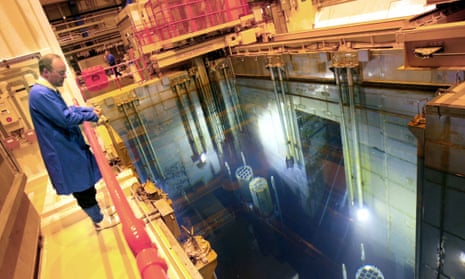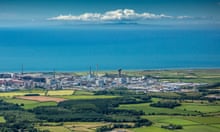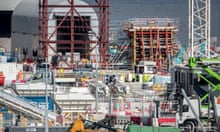The government is expected this week to begin a nationwide search for a community willing to host an underground nuclear waste dump to store highly radioactive material for thousands of years.
Britain has been trying for years to secure a site with the right geology and local communities which would volunteer to host a £12bn geological disposal facility (GDF), as a long-term solution for the most dangerous waste from nuclear power stations.
The last effort hit a brick wall in 2013 when Cumbria county council, the only local authority still in the running as a host for the dump, rejected it.
Now, ministers are to relaunch their mission to win over a community to host the GDF. The task has taken on heightened importance now that a nuclear power plant is under construction in Somerset, with plans to build four others.
Radioactive Waste Management, the government body tasked with building the facility hundreds of metres underground, said it had made significant progress since 2014 in “developing the offer” to interested communities.
The energy minister Richard Harrington has said construction of the GDF would create 1,000 jobs and running it would create 600 more.
Consultations on the planning process and how the government will work with communities will be launched this week, said two sources close to the process. “I hope to God they get it right this time,” said one. “The mess they made in the past can’t be repeated. It’s outrageous it became a victim of local politics last time.”
In January 2013, Cumbria council’s cabinet voted against preliminary work starting on the facility, with the Conservative council leader citing concerns about the local geology. The decision came five months before local elections.
After the failures of 2013, a 2014 white paper set out the government’s new plans, which are still based on gaining the consent of a community.
Experts said success in finding a site would hinge on suitable geology and acceptance by the public.
Prof Neil Hyatt, who heads the department of materials science and engineering at the University of Sheffield, said: “It’s having the right geology coupled with community acceptance. The geological setting needs to be able to isolate the radioactive waste from the surface for the required timescale, which is hundreds of thousands of years.”
A national geological screening report has been undertaken to identify the most favourable parts of the country, but Hyatt said further information was needed.
Ann McCall, the geological disposal facility siting and engagement director of Radioactive Waste Management, told a conference in December that building the GDF was “mission critical” to store the UK’s radioactive waste, which the country has “an awful lot of”.
She said the agency would soon launch a campaign website to increase awareness and engagement with the public, adding: “It’s not possible to foist a solution on a community.”
The facility would be sited in England or Wales, as Scotland prefers a ground-level store. High-level waste, the most radioactive material, would not be moved there for many decades.
Nuclear waste is currently stored at about 30 sites, but predominantly at ground level at Sellafield in Cumbria.
The project is expected to cost £12bn, spread over a century. The government will bear 55% of the cost, owners of new-build plants such as EDF another 35%, and the final 10% will be covered by a liability fund set aside by previous nuclear operators.
The price tag could go up or down depending on how much waste the facility needs to store, said Hyatt. “There is a lot of uncertainty around costs.” Other nuclear countries, such as Finland, have already started building underground stores.
One senior industry figure said: “Lots of other countries would just get on and do this. They’ve got to do something. They can’t keep ducking this.”











Comments (…)
Sign in or create your Guardian account to join the discussion